- europages
- >
- COMPANIES - SUPPLIERS - SERVICE PROVIDERS
- >
- stone crusher
Results for
Stone crusher - Import export
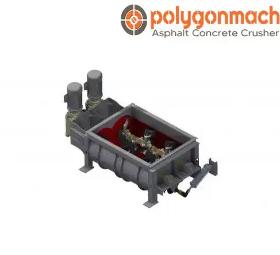
POLYGONMACH MAKINE SANAYI VE TICARET LTD STI
Turkey
What is a Twin-Shaft Asphalt Mixer? The Twin Shaft Asphalt Mixer is, out of necessity, one of the main asphalt mixing machines designed for mixing aggregates with binders and additives for producing asphalt mixtures in road construction and infrastructure projects. A twin shaft asphalt mixer has two horizontally aligned shafts fitted with mixing arms, paddles, or blades rotating in opposite directions. This combination ensures that the input material will be well mixed and homogenized to produce high-quality asphalt mixtures consistently and reliably. What makes twin shaft mixers effective is the fact that they can process large volumes of materials without compromising mixing efficiency. They, therefore, hold a special place in industries in which uniform asphalt mix production becomes fast and efficient. Twin shaft mixers provide sturdy asphalt required for enduring infrastructural strains on highways, bridges, and urban roads.
Request for a quote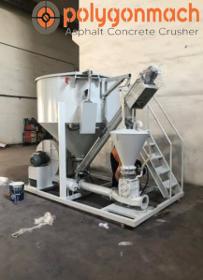
POLYGONMACH MAKINE SANAYI VE TICARET LTD STI
Turkey
The Asphalt Fiber Granule Additive System is a modern, pre-engineered component assembled in asphalt plants for the introduction of fiber granules into asphalt mix with needed precision and control. These fiber granules play a vital role in strengthening asphalts against cracking, rutting, and other distresses. Fiber granules enhance the durability and performance of asphalt pavements, allowing them to sustain increasing volumes and intensities of traffic without being affected by various harsh weather conditions. The system is critical in the manufacture of high-quality asphalt mixes qualified enough for modern infrastructure. The effect of adding fiber granules into an asphalt mix is reinforcing; much the same way rebar does in concrete. This reinforcement allows such loads to distribute further out in the pavement, minimizing the chances of damage with time.
Request for a quote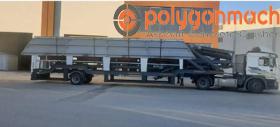
POLYGONMACH MAKINE SANAYI VE TICARET LTD STI
Turkey
A Mechanical Stabilization Plant: What Is It? In order to enhance the qualities of soil and make it more suitable for constructing infrastructure such as roads highways and airport runways the construction industry uses mechanical stabilization plants. In order to improve the strength durability and load-bearing capacity of the soil binding agents like lime cement or foamed bitumen are blended into the soil. The objective is to produce a uniform stable material that can back the building of long-lasting structures and surfaces. In situations where the native soil lacks the necessary qualities for construction mechanical stabilization plants are crucial. By modifying the properties of the soil these plants guarantee that the foundation is robust enough to support large loads and withstand environmental influences.
Request for a quote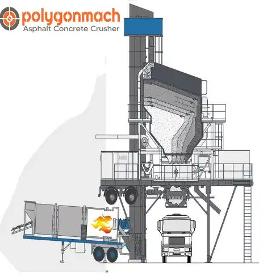
POLYGONMACH MAKINE SANAYI VE TICARET LTD STI
Turkey
Hot mix Asphalt Plant Types Hot mix asphalt plants can be configured in a variety of ways to suit the needs of different projects. The main varieties are portable mobile and stationary plants each has a special benefit depending on the size and specifications of the building projects it supports. Because of their steady setup and high production capacity stationary plants—which are fixed at a single location—are perfect for big long-term projects. On the other hand plants that are mobile or portable provide flexibility and mobility enabling them to be quickly moved to various job sites. This makes them appropriate for smaller more dynamic projects or those that need frequent site changes. This adaptability is best demonstrated by Polygonmachs mobile or portable hot mix asphalt plant. These plants are lightweight portable and quickly assemble they require little work to assemble disassemble and move.
Request for a quote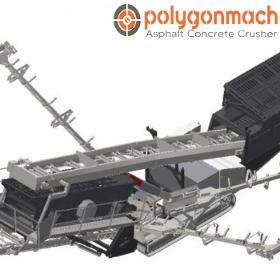
POLYGONMACH MAKINE SANAYI VE TICARET LTD STI
Turkey
The newly installed track-mounted impact crusher meets high-capacity demands of modern construction and mining projects. With this latest crusher, you are assured of a capacity of up to 200 – 350 t/h, hence enabling you to handle even larger volumes of material efficiently. The feeding mouth with an opening size of 1,200 x 900 mm permits easy feeding of larger material. Pre-processing becomes minimal with increased productivity. In turn, this high-capacity performance makes this an asset worthy of our impact crusher for any project that requires robust and efficient crushing solutions. Advanced Crushing with Optimal Opening Size The feeding opening size of our track-mounted impact crusher is 1,200 x 900 mm, the main feature for the effective processing of a wide range of materials. With this feed opening size, blockages are reduced and materials feed effortlessly for smooth operation, enhancing general efficiency in the process of crushing.
Request for a quote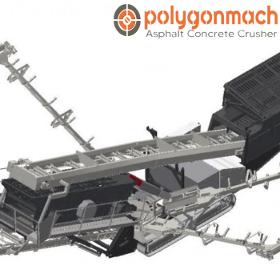
POLYGONMACH MAKINE SANAYI VE TICARET LTD STI
Turkey
Our track-mounted impact crusher is a powerhouse, uniquely designed to deliver exceptional crushing performance and boast a high capacity of 200 - 350 t/h. This strong machine has an impressive opening size of 1,200 x 900 mm that enables it to carry out effective processing of big-sized materials. The rotor size is 1100 x 1300 mm. Due to intensive crushing along the whole length of the crusher, an optimal treatment result is achieved. Impressive in weight-54,000 kg-our crusher was meant for harsh conditions to give you years of dependable service on your most demanding projects.
Request for a quote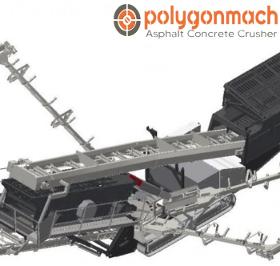
POLYGONMACH MAKINE SANAYI VE TICARET LTD STI
Turkey
Our track-mounted impact crusher has been designed to offer superior performance and applicability. The rugged capacity of our machine ranges from 120 to 250 t/h, making it versatile for various applications in the industry. The rotor size stands at 1,050 x 820 mm, giving fair crushing results that will provide good-quality aggregates. This weight of the crusher at 41,800 kg reflects solidity in construction, resilient to bear some of the harshest conditions. These technical specifications speak to our commitment to high-performance equipment that addresses our customer's needs. High Capacity Crushing Optimised The track-mounted impact crusher has a high throughput and is fitted with a capacity ranging from 120 to 250 t/h, thus being perfectly suitable for large-scale projects. This assured high capacity will ensure that you process substantial volumes of material efficiently and hence minimize the hour consumption of operations, raising your productivity.
Request for a quote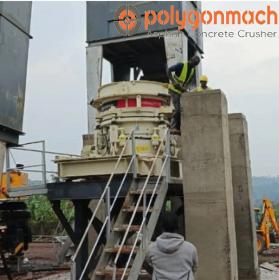
POLYGONMACH MAKINE SANAYI VE TICARET LTD STI
Turkey
A (VSI) Vertical Shaft Impact Crusher, commonly known as VSI crusher, is a type of crushing machine that utilizes a high-speed rotor with wear-resistant tips or anvils to crush materials into fine particles. Unlike conventional crushers that use compression or impact forces to break down materials, VSI crushers operate by throwing the material against stationary anvils, shaping the material into desired sizes. This process occurs as the rotor spins at high speeds, centrifugal forces propel the material outward, and the impact between the material and the anvils crushes the material into smaller particles. (VSI) Vertical Shaft Impact Crusher are renowned for their ability to produce well-shaped cubical end products and are commonly used in the production of high-quality aggregates, sand, and other construction materials. (VSI) Vertical Shaft Impact Crusher are versatile machines that find widespread applications in various industries, including mining, quarrying, and construction.
Request for a quote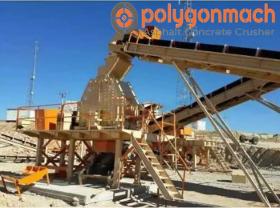
POLYGONMACH MAKINE SANAYI VE TICARET LTD STI
Turkey
A Tertiary Impact Crusher can be understood as a kind of crushing machine to carry out further reduction of material past primary and secondary crushers. The Tertiary Impact Crusher works as an HSI. The stocky rotor customer-engineered by General Kinematics to have impact tools blowing bars or hammers turning at higher speeds smashes the material. These impact tools work extremely fast to achieve impacts that will break down the material into small, homogenized, and delicate particles. Our Tertiary Impact Crushers are designed for making optimal shaped aggregates and crushed materials with high fineness, for maximum control over particle size and shape and contributing to the achievement of product requirements in various industries and applications. Tertiary Impact Crushers are important in the final stage of crushing. This has been declared to be the final shattering that the materials undergo, which puts them to the characteristics needed in the end product.
Request for a quote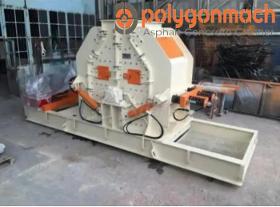
POLYGONMACH MAKINE SANAYI VE TICARET LTD STI
Turkey
The Horizontal Shaft Impactor (HSI) commonly referred to as a Tertiary Impact Crusher is a type of crushing equipment used to further reduce materials that have been processed through primary and secondary crushers into even finer particles. The last stage of crushed materials with exact particle sizes and shapes are usually produced by tertiary impact crushers. They work by applying high-speed impacts to break down the material using a horizontal shaft fitted with hammers or blow bars. A tertiary impact crushers main purpose is to refine the product to the appropriate size and shape in order to meet particular needs in a variety of applications including mining recycling and aggregate production. By producing finely crushed products appropriate for end-use applications tertiary impact crushers play a critical role in the last stage of material processing.
Request for a quote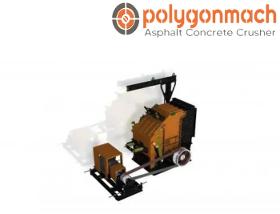
POLYGONMACH MAKINE SANAYI VE TICARET LTD STI
Turkey
A Secondary Impact Crusher is a type of crushing machine that typically comes in the form of a Horizontal Shaft Impactor (HSI). This crusher is designed to provide secondary or tertiary crushing capabilities by generating high-speed impact forces to further reduce the size of the material processed. In comparison to a Primary Impact Crusher, a Secondary Impact Crusher is usually aimed at producing smaller, finer particles and more refined end products. It operates by utilizing a rotating rotor equipped with impact tools such as hammers or blow bars that strike the incoming material, causing it to break apart through impact forces. Secondary Impact Crushers are commonly used after primary crushers in various industries such as mining, quarrying, and recycling to achieve a more refined product size or shape. These crushers excel at producing well-shape aggregates, finely crushed materials, and secondary applications requiring fine particle sizes.
Request for a quote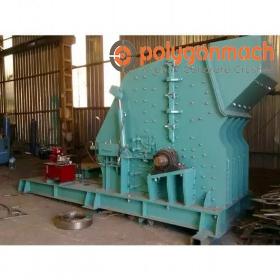
POLYGONMACH MAKINE SANAYI VE TICARET LTD STI
Turkey
Similar to a primary impact crusher a secondary impact crusher (HSI) is a kind of crushing equipment that produces products with a finer more uniform size. Secondary impact crushers are frequently used following the primary crushing stage because they can handle smaller feed sizes than primary crushers. The material enters the crusher and is struck by hammers or blow bars attached to a rotor which breaks the material apart and reduces its size even more. The capacity of secondary impact crushers to produce high-speed impacts that pulverize material into a finer product appropriate for secondary crushing or final applications in a variety of industries is well known. The capacity of Secondary Impact Crushers to generate a variety of products such as fine aggregates sand and finely crushed materials accounts for their adaptability. In industries like mining and recycling or in the manufacturing of asphalt and concrete aggregates where a higher level of product refinement is necessary
Request for a quote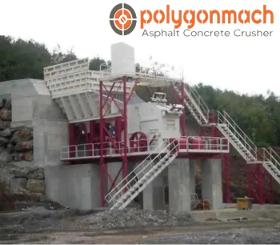
POLYGONMACH MAKINE SANAYI VE TICARET LTD STI
Turkey
A Primary Impact Crusher is a heavy-duty machine designed to crush large and tough materials into smaller sizes for further processing or use. It operates by utilizing high-speed impact forces generated by a rotating rotor fitted with blow bars or hammers. As the material is fed into the crusher, it is violently struck by the rapidly rotating rotor and impact tools, causing it to break apart into smaller pieces. The primary impact crusher is typically used in applications where large feed sizes and high reduction ratios are required, such as in mining, quarrying, and recycling operations. Its robust construction and powerful impact forces make it suitable for processing various materials, ranging from hard rock to recycled concrete and asphalt. The main purpose of a Primary Impact Crusher is to provide initial size reduction of material, producing a consistent and high-quality product.
Request for a quote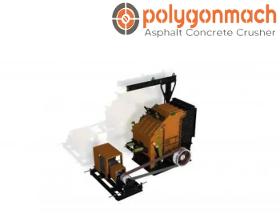
POLYGONMACH MAKINE SANAYI VE TICARET LTD STI
Turkey
One kind of heavy-duty crushing machinery that uses impact force to reduce material size is the Horizontal Shaft Impactor (HSI) Primary Impact Crusher. The material is shattered by the impact force and the high-speed collisions against the plates or other particles in an HSI crusher which uses a rotating horizontal shaft to propel material towards fixed breaker plates as opposed to jaw crushers which compress the material between two plates. For many aggregate applications a high-quality cubical-shaped product is what this crushing method excels at producing. The HSI crusher is a great option for primary crushing operations where large materials need to be broken down efficiently because of its design which enables it to handle larger feed sizes. Because of its adaptability and capacity to produce a variety of particle sizes with good shape the HSI Primary Impact Crusher finds extensive application in the recycling and construction sectors as well as in mineral processing operations.
Request for a quote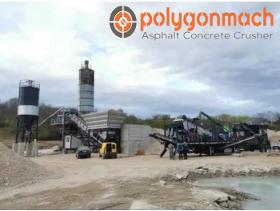
POLYGONMACH MAKINE SANAYI VE TICARET LTD STI
Turkey
The PMCC2 is a mobile jaw and cone crusher - 1 for the secondary and tertiary grades of crushing and screening. It includes a primary Jaw Crusher and a secondary or tertiary Cone Crusher. This system allows for the effective processing of literally any material, from hard stone to soft minerals, which gives great flexibility and versatility in the operation of material crushing. The PMCC2 model features high performance, mobility, and adaptability, thus making it ideal for mining, construction, and quarrying applications for the production of different grades of aggregates. This unit comes typically equipped with advanced technologies for best efficiency and quality of output, thereby leading to successful material processing operations. Introducing the game-changing PMCC-2 from Polygonmach—a crushing and screening plant on wheels that comes with the jaw-jaw configuration, hosting 120-150 TPH robust capacity, depending upon the gradians of material hardness.
Request for a quote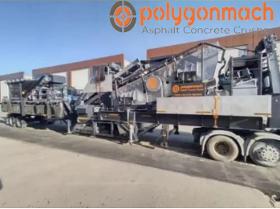
POLYGONMACH MAKINE SANAYI VE TICARET LTD STI
Turkey
Mobile Jaw and Cone Crusher 1-PMCC1 can be classified into the category of mobile crushing and screen equipment. It has the potential to process an extensive variety of materials by combining jaw and cone crushing. This unit usually is equipped with a jaw crusher acting as primary crusher equipment, which can break stones or minerals to small pieces, making them easy to handle. The cone crusher allows for secondary or tertiary crushing, creating high and homogeneous final output, which are further processed or used as end products. Typically, most PMCC1 models are fitted with such advanced features, giving them adjustable settings to control the size of the output material to be produced, hence flexibility in meeting all other project requirements. PMCC1 will be provided with a combination of both jaw and cone crushers that will offer an integrative solution for mining, construction, quarrying, and other industries of a like nature in processing different materials.
Request for a quote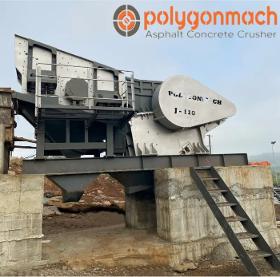
POLYGONMACH MAKINE SANAYI VE TICARET LTD STI
Turkey
100-150 tph Basalt Crushing and Screening Plants are specialized facilities designed for processing basalt stones into various sizes of aggregates at a throughput capacity ranging from 100 to 150 tons per hour. These plants are equipped with machinery and equipment tailored for handling basalt, a durable volcanic stone known for its strength and versatility. The primary function of these plants is to crush large basalt stones into smaller fragments and then screen them to produce high-quality aggregates suitable for applications in construction, infrastructure development, and industrial projects. By efficiently processing basalt, these plants play a vital role in producing robust materials essential for various construction endeavors requiring resilient and reliable aggregates.
Request for a quoteDo you sell or make similar products?
Sign up to europages and have your products listed
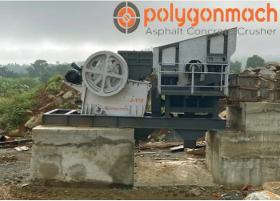
POLYGONMACH MAKINE SANAYI VE TICARET LTD STI
Turkey
350-500350-500 tph Dolomite Crushing Screening Plants are modern industrial plants designed to process dolomite ore in order to produce a great variety of dolomite aggregates that are demanded by different construction projects. The abbreviation "tph" itself means the capacity of the plant dealing with the amount of material per hour; therefore, this plant processes 350 to 500 tons of dolomite ore in an hour. Dolomite, the calcium magnesium carbonate mineral, is very essential in the construction industry in making concrete aggregates and road base materials, among other important construction materials. These high-capacity plants play an important role in the crushing and screening of dolomite ore efficiently into specified requirements for construction projects, thereby ensuring a constant supply of superior quality dolomite aggregates for construction applications.
Request for a quote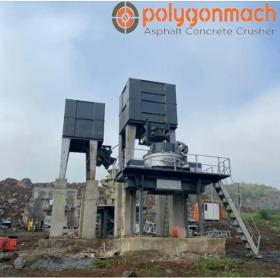
POLYGONMACH MAKINE SANAYI VE TICARET LTD STI
Turkey
The 50-100 TPH granite crushing and screening plant is a course applied in the production line that crushes granite stones to produce the required size of aggregate in the range of 50 to 100 tonnes per hour. The design is for processing granite condensations of hard nature made from hard raw materials. The plant normally has primary and secondary crushers, vibrating screens, conveyors and feeders. The primary crushers reduce the granitic large stones to significant parts and the secondary crushers crush these lowers into particle sizes. After the crushing process, the material is required to be sifted using the vibrating screens to classify it into different sizes. It must comply with some stringent criteria to be applied in numerous construction and industrial operations. Since the plants have been set up for producing high quality, they can be used in a variety of construction needs—be it for building, building infrastructures, constructing roads, or even working on landscape projec
Request for a quote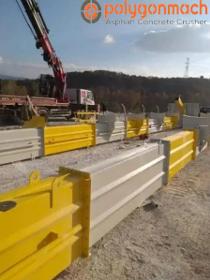
POLYGONMACH MAKINE SANAYI VE TICARET LTD STI
Turkey
What is a Cement and Filler Elevator? A cement and filler elevator is an integral part of a vertical conveyor system, specially designed for the movement of cement, fillers, and other powder materials in a number of industrial contexts. These elevators find application in many industries where the bulk materials need to be moved vertically, like in cement plants and concrete batching plants at construction job sites. Using a number of attached buckets or compartments to a belt or self-supported chain, the elevator efficiently raises the materials from one level to another within the production or storage area, streamlining the process and improving overall workflow. A cement and filler elevator is designed considering such aspects as durability and efficiency. The system has been structured to hold heavy loads that are characteristic of cement and filler materials; this ensures that materials are delivered to their destinations with success and without any disruption.
Request for a quote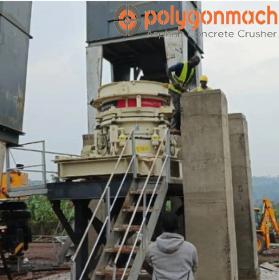
POLYGONMACH MAKINE SANAYI VE TICARET LTD STI
Turkey
A 40-60 TPH dolomite ore crushing and screening plant is a dolomite processing plant, which processes dolomite ore into the required sizes of any kind of aggregate that is used in construction. A TPH is a unit representing tonnes per hour. In this description, the plant has an input capacity to accommodate and treat between 40 and 60 tons of dolomite ore per hour. Dolomite is an important mineral rock that is high in calcium magnesium carbonate and finds much application in the construction industry, particularly in the manufacture of concrete aggregates and road base materials, among other construction-based products.
Request for a quote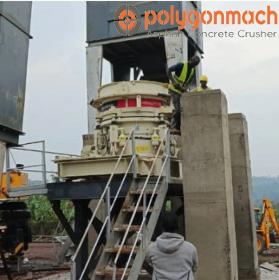
POLYGONMACH MAKINE SANAYI VE TICARET LTD STI
Turkey
The 40-60 TPH Riverstone crushing and screening plants are made for the production of top-quality aggregates from Riverstones effectively at a capacity of 40-60 short tons per hour. The pre-primary crushing machinery, screening equipment, and conveying systems of this plant are specially designed for the processing of Riverstones. These plants break the raw Riverstones into smaller pieces with the help of primary crushers such as jaw crushers or impact crushers. This starts the initial process. The product from primary crushing is later passed through vibrating screens for the purpose of classifying the aggregates into various fractions according to size. This screening procedure is very vital to ensure that the final aggregates produced meet the quality standards for use in various construction, landscaping, and industrial applications. By processing Riverstones systematically, the 40-60 tph Riverstone Crushing and Screening Plants turn them into a better aggregate that will
Request for a quote
POLYGONMACH MAKINE SANAYI VE TICARET LTD STI
Turkey
Planetary concrete mixers are one of the most specific mixing machines in the building industry for high-quality concrete mixes. They have a particular design where the mixing blades or paddles are fixed at one end of a vertical rotational shaft that not only rotates around its axis but also in orbit around the middle axis of the mixing bowl. The dual action brings about a planetary mixing action that enables thorough blending of concrete ingredients—cement, aggregates, water, and admixtures. Planetary concrete mixers, therefore, deliver homogeneous mixes of all types because of the sensitive and multidirectional mixing availed by the said action. In this regard, these mixers are well suited for applications that have embraced modern technological mixes requiring uniform concrete mixtures with specific properties.
Request for a quote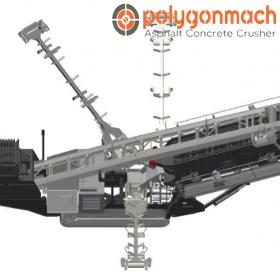
POLYGONMACH MAKINE SANAYI VE TICARET LTD STI
Turkey
The PTV700 is a high-efficiency vertical impact crusher, with advanced technology to better complete the crushing in each operation. This is highly effective in construction projects requiring finely crushed aggregate. The advanced grinder can be applied for a number of purposes in sand production and mineral processing. Considering its technical parameters, this sets a new standard in crushing technology. Material processing is highly accurate, and the quality of an output product is uniformly high due to a closed rotor type featured by this crusher. Thus, the given model is a sufficient and really powerful solution for contemporary requirements in crushing due to its sturdy structure and advanced features.
Request for a quote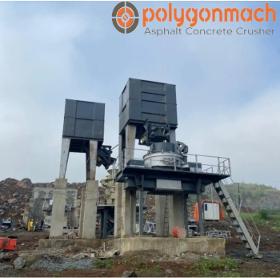
POLYGONMACH MAKINE SANAYI VE TICARET LTD STI
Turkey
Riverstone is commonly a natural stone, typically located in or around rivers and streams. Its large nature can best be categorized as smooth and round. Over some time, the waters move over them and these stones are polished, and hence their common shape or texture. The various distinct differences in them include sizes, colours and compositions. Gray, tan, brown, and red are the common colour shades for riverstones. Being naturally smooth-surfaced with a luring appearance makes them quite popular for use in landscaping and beautification. Depending on the setting, be it in a path, edge of a garden, or a water feature, riverstones will bring an element of natural beauty to the setting generally creating peace and proper organic feel in an outdoor space.
Request for a quote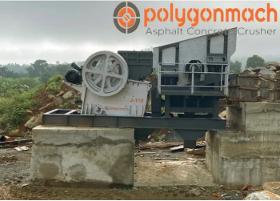
POLYGONMACH MAKINE SANAYI VE TICARET LTD STI
Turkey
700-1000 tph Granite Crushing and Screening Plants are the latest facilities. The plants aim, particularly, in the processing of stone granites to high-quality aggregates with a variable capacity of 700 to 1000 tons per hour. These advanced plants have been engineered with primary crushers, secondary crushers, vibratory screening plants, conveyors, and feeders facilitating efficient crushing and screening. Where primary crushers in the plant reduce oversized granite rocks to smaller fragments, secondary crushers continue to refine the material one step further to the target sizes for aggregates. Thoroughly screened using vibrating screens, the aggregate fractions are then sized and classified according to sizes into the final product to a very high standard to every highly diversified usage in construction, infrastructure, and industry. Through processing granite stones in a systematic manner, such plants give high-quality aggregates that are used in different construction projects to
Request for a quote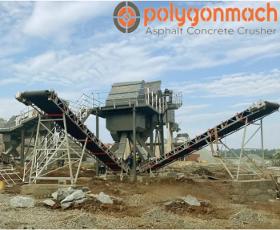
POLYGONMACH MAKINE SANAYI VE TICARET LTD STI
Turkey
The 500-750 tph Granite Crushing and Screening Plants are high-tech installations permitting the processing of granites in large quantities to high-quality aggregates at an impressive production capacity, in the range of 500 to 750 tons per hour. These plants consist of primary crushers, secondary crushers, vibrating screens, conveyors, and feeders, designed under the principle of working hard for the careful optimization of crushing and screening processes. In the advanced plants, the primary crushers are servicing the purpose of breaking big granite rocks into fragments of smaller size; secondary crushers then receive the product from these to further crush it in order to come up with the aggregate of the desired size. Vibrating screens are used for screening the crushed stone material to separate the product into fractions of various size in order to secure that final aggregates are of high quality to be used in various construction projects, infrastructure developments, and industr
Request for a quote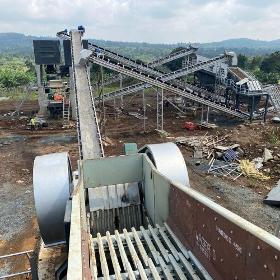
POLYGONMACH MAKINE SANAYI VE TICARET LTD STI
Turkey
The 350-500 tph Granite Crushing and Screening Plant is one of the large full-featured plants unveiled for the market, designed to generate quality granite aggregate, at processing intensity levels from 350 to 500 TPH. These plants come championed with primary crushers, secondary crushers, operating conveyors and feeders, vibrating screens, all gruesomely engineered for optimum crushing and screening effectively. The primary crushers are expected to reduce oversize granite rocks into properly sized fragments for processing to produce more value-added building material. The secondary crushers are for a finer aspect of anything so that they reach the ideal size aggregate, and the vibrating screens perform an accurate classification of the crushed stone into different fractions, by size. Such stringent screening ensures that the end aggregates are produced of remarkable quality for use in various kinds of construction work and infrastructural projects as well as in many industrial applica
Request for a quote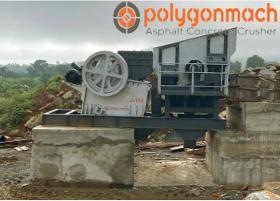
POLYGONMACH MAKINE SANAYI VE TICARET LTD STI
Turkey
The 250-350 tph Granite Crushing and Screening Plant is technically a very advanced construction that is meant to produce granite stones with different aggregates of 0-5, 5-10, 10-15, and 15-20 mm. These plants consist of primary crushers, secondary crushers, vibrating screens, conveyors, and feeders that have been designed to optimize the crushing and screening process fully. The primary crushers of these plants perform a highly important function in the process of fragmentation of large stones of granite and their crushing into small pieces, which will later be reduced by the secondary crushers to the desired size of aggregates. After that, the fractioned material goes through the vibrating screens for a strict screening and separation into fractions according to size, thus providing that the final aggregates will be in strict compliance with high-quality specifications for use in construction works and other industrial applications.
Request for a quoteResults for
Stone crusher - Import exportNumber of results
117 ProductsCompany type